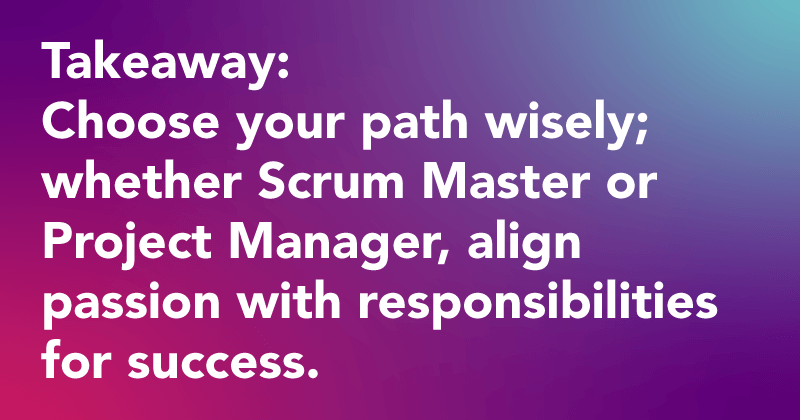Table of Contents
ToggleIn the world of Agile project management, two key roles emerge as pivotal in ensuring successful project delivery: the Scrum Master and the Project Manager. While both roles contribute to the overall success of a project, they have distinct responsibilities and skill sets. Understanding the differences between a Scrum Master and a Project Manager is crucial for individuals aspiring to excel in the field of project management.
This article aims to unravel the disparities between these two roles, helping you determine which path holds the key to success in your career.
What are the Roles and Responsibilities of a Scrum Master?
A Scrum Master is the guardian of the Agile development process. They facilitate the implementation of Scrum principles and practices, ensuring that the team adheres to Agile methodologies. The primary responsibility of a Scrum Master is to remove any impediments that hinder the team’s progress. They act as servant-leaders, empowering the team to self-organize and make informed decisions.
Facilitator of Agile Methodologies:
Functioning as a facilitator, the Scrum Master ensures the team’s unwavering adherence to Agile methodologies, cultivating an environment that nurtures collaboration and innovation.
Obstacle Elimination:
At the core of their mission is the proactive removal of obstacles that may hinder the team’s progress, embodying servant-leadership principles by empowering team members to self-organize and make well-informed decisions.
Event Orchestration:
Beyond their overarching responsibilities, a Scrum Master plays a key role in orchestrating essential Scrum events. These include Sprint Planning, Daily Stand-ups, Sprint Reviews, and Retrospectives, where their adept facilitation ensures seamless execution and enhanced teamwork.
Coaching and Guiding:
Functioning as a coach, the Scrum Master guides team members in the application of Agile principles, fostering a culture of continuous improvement. This coaching role extends beyond mere facilitation, empowering the team to evolve and adapt.
Cultivating Team Autonomy:
With an unwavering focus on team dynamics, the Scrum Master works towards creating a dynamic and autonomous team environment. This environment lays the groundwork for sustained productivity and success.
In essence, the Scrum Master’s multifaceted roles encompass not only facilitating Scrum events but also championing Agile principles, eliminating obstacles, coaching team members, and cultivating an environment that fosters continuous improvement and autonomy.
What are the Roles and Responsibilities of a Project Manager?
In contrast to a Scrum Master, a Project Manager operates within a more traditional project management framework. Their primary responsibility is to plan, execute, and deliver projects within the defined constraints of time, scope, and budget. Project Managers are accountable for the project’s overall success and are involved in all project phases, from initiation to closure.
Overall Project Success:
At the forefront of a Project Manager’s duties is the overarching responsibility for the project’s success. Engaging in all project phases, from initiation to closure, they orchestrate the seamless progression of the project toward its objectives.
Strategic Project Planning:
Project Managers are instrumental in creating comprehensive project plans, meticulously identifying potential project risks, and developing strategic approaches to mitigate these risks effectively.
Resource Management:
In addition to strategic planning, Project Managers excel in resource management. They allocate tasks, monitor progress, and ensure optimal utilization of project resources to maintain efficiency throughout the project lifecycle.
Communication Nexus:
Communication emerges as a cornerstone of a Project Manager’s responsibilities. With a keen eye on effective project governance, they articulate project status, risks, and issues, ensuring transparent and timely communication with stakeholders.
Alignment with Organizational Objectives:
Beyond project execution, a Project Manager ensures that the project aligns seamlessly with the organization’s overarching objectives. This involves a continuous assessment to ensure the project meets the expectations of the project sponsor.
In essence, a Project Manager’s multifaceted roles encompass strategic planning, resource management, transparent communication, and alignment with organizational objectives. Operating within a traditional project management framework, they navigate the complexities of project execution from initiation to closure, ultimately ensuring the project’s success within defined constraints.

What are the Key Differences between a Scrum Master and a Project Manager?
While both a Scrum Master and a Project Manager contribute to project success, there are key differences in their roles and responsibilities.
Strategic Focus on Methodologies:
Scrum Master:
Focusing on Agile methodologies, the Scrum Master diligently oversees the adherence to the Scrum framework. Their primary objective lies in facilitating the team’s self-organization and the removal of impediments that may impede progress.
Project Manager:
In contrast, a Project Manager operates within a traditional project management framework, ensuring projects adhere to predefined constraints. Their strategic focus encompasses planning, execution, and the overall success of the project.
Team Dynamics and Day-to-Day Involvement:
Scrum Master:
Central to the Scrum Master’s role is a hands-on approach to team dynamics. They actively engage in day-to-day activities, fostering an environment that encourages collaboration and innovation.
Project Manager:
Conversely, a Project Manager may not have a direct role in the team’s day-to-day activities. Instead, their emphasis lies in managing resources and facilitating effective communication with stakeholders.
Scope of Responsibilities:
Scrum Master:
The Scrum Master’s scope revolves around Agile methodologies, with a primary goal of ensuring the team’s adherence to the Scrum framework and overcoming obstacles to progress.
Project Manager:
Contrastingly, the Project Manager takes on a broader responsibility spectrum, encompassing planning, execution, and the overall success of the project within predefined constraints.
Resource Management:
Scrum Master:
While the Scrum Master focuses on team dynamics, they may not have direct involvement in resource management, with their primary focus on Agile methodologies.
Project Manager:
In the realm of resource management, the Project Manager takes a pivotal role, ensuring effective allocation and utilization to meet project objectives.
In summary, while both the Scrum Master and Project Manager contribute to project success, their roles diverge significantly. The Scrum Master delves deep into Agile methodologies, team dynamics, and overcoming obstacles, while the Project Manager operates within a traditional framework, focusing on broader project management aspects, resource allocation, and stakeholder communication.
Which Path Holds the Key to Success?
Determining which path holds the key to success depends on your skills, interests, and the project management approach you resonate with. If you thrive in a dynamic, ever-evolving environment and have a passion for Agile methodologies, becoming a Scrum Master may be the right choice for you. The Scrum Master role allows you to foster collaboration, promote self-organization, and enable teams to deliver high-quality products.
On the other hand, if you enjoy planning, strategizing, and managing projects from initiation to closure, pursuing a career as a Project Manager might be the ideal path for you. As a Project Manager, you will have the opportunity to lead and coordinate diverse teams, ensure project success, and contribute to the growth and success of the organization.
Ultimately, the key to success lies in finding a role that aligns with your strengths, passions, and career aspirations. Take the time to explore both roles and gain a deep understanding of their responsibilities before making a decision.
The Benefits of Having a Scrum Master and a Project Manager on a Team
While Scrum Masters and Project Managers have distinct roles, their collaboration can greatly benefit a project.
Agile Expertise Unleashed:
The Scrum Master contributes invaluable Agile expertise, ensuring the team’s unwavering adherence to Agile principles. This commitment fosters transparency, continuous improvement, and adaptability, creating an environment that encourages collaboration and empowers team members for heightened productivity and superior outcomes.
Project Management Prowess:
Conversely, the Project Manager plays a pivotal role in providing overall project management guidance. Their focus extends to ensuring the project’s execution within defined constraints, aligning with organizational objectives, managing stakeholders, and mitigating risks.
Harmonizing Agile and Strategic Planning:
The Scrum Master’s Agile mindset seamlessly aligns with the Project Manager’s attention to detail and strategic planning. This harmonious collaboration results in a well-managed project that not only meets but exceeds both business and customer expectations.
In essence, the collaborative partnership between a Scrum Master and a Project Manager blends the Agile expertise of the former with the project management prowess of the latter. This synergy creates an environment where distinct roles converge towards unified project goals, ensuring optimal outcomes that align with organizational objectives and exceed stakeholder expectations.
How to Become a Scrum Master?
To become a successful Scrum Master, it is essential to acquire the necessary skills and knowledge. Start by familiarizing yourself with Agile principles and methodologies. Consider obtaining certifications such as Certified Scrum Master (CSM) or Professional Scrum Master (PSM) to validate your expertise.
Foundational Knowledge:
Embarking on the journey to becoming a successful Scrum Master necessitates acquiring foundational skills and knowledge. Start by immersing yourself in Agile principles and methodologies, establishing a solid understanding of the fundamental concepts that underpin Scrum practices.
Certification Milestones:
Take concrete steps towards validation by considering certifications such as Certified Scrum Master (CSM) or Professional Scrum Master (PSM). These certifications serve as tangible markers of your expertise and commitment to mastering the intricacies of Scrum.
Hands-On Experience:
Translate theoretical knowledge into practical proficiency by actively participating in Agile teams and immersing yourself in Scrum events. Gaining hands-on experience is crucial for honing your skills and developing a nuanced understanding of how Scrum principles are applied in real-world scenarios.
Embracing the Servant-Leader Mindset:
Cultivate the servant-leader mindset, a cornerstone of effective Scrum Masters. Focus on facilitating collaboration among team members and proactively removing impediments that hinder progress. This mindset is pivotal in creating an environment that fosters teamwork and innovation.
Commitment to Continuous Learning:
Recognize that the journey to Scrum mastery is an ongoing process. Stay abreast of the latest Agile practices, methodologies, and industry trends. Commit to continuous learning to ensure that your skills remain relevant and adaptable in the dynamic landscape of Agile development.
By strategically navigating these steps—building foundational knowledge, securing certifications, gaining hands-on experience, embracing the servant-leader mindset, and committing to continuous learning—you pave the way for a successful journey towards becoming an adept and respected Scrum Master.
How to Become a Project Manager?
Becoming a Project Manager requires a combination of technical expertise, leadership skills, and effective communication. Obtain a degree in project management or a related field to build a strong foundation. Consider pursuing certifications such as Project Management Professional (PMP) to enhance your credentials.
Building a Robust Foundation:
Embarking on the journey to become a Project Manager necessitates a blend of technical expertise, leadership prowess, and effective communication. Lay a solid groundwork by acquiring a degree in project management or a related field, forming the cornerstone of your professional journey.
Credential Enhancement:
Elevate your professional profile by pursuing certifications like Project Management Professional (PMP). These credentials not only bolster your knowledge but also validate your proficiency in project management, opening doors to greater opportunities.
Practical Experience Accumulation:
Navigate the path to Project Manager status by gaining hands-on experience in various project capacities. Initiate your journey by working on projects and progressively shoulder increased responsibilities. This practical exposure is invaluable in honing skills like project planning, risk management, and effective stakeholder communication.
Skill Development Focus:
Direct your efforts towards developing key competencies, especially in critical areas such as project planning, risk management, and communication with stakeholders. Cultivate a skill set that extends beyond the technical aspects, encompassing the leadership attributes essential for excelling in the dynamic role of a Project Manager.
Leadership Refinement:
Recognize the pivotal role of leadership in project management success. Hone your leadership abilities to navigate the complexities of project execution, fostering a collaborative and efficient team environment.
Strategic Mindset Cultivation:
Go beyond tactical proficiency and cultivate a strategic mindset essential for effective project management. Understand the broader organizational context and develop the ability to align project goals with overarching business objectives.
In essence, the journey to becoming a Project Manager involves building a strong educational foundation, enhancing credentials, accumulating practical experience, honing crucial skills, refining leadership abilities, and cultivating a strategic mindset. This holistic approach positions aspiring Project Managers for success in the multifaceted realm of project management.
Learn more: The Essential Guide: How To Become A Project Manager

Career Prospects and Growth Opportunities
Both Scrum Masters and Project Managers offer promising career prospects and growth opportunities. As organizations increasingly adopt Agile methodologies, the demand for Scrum Masters continues to rise. Project Managers, on the other hand, can explore opportunities in various industries and sectors.
Promising Trajectory for Scrum Masters:
In the evolving landscape of Agile methodologies, Scrum Masters find themselves in high demand. As organizations increasingly embrace Agile, the career prospects for Scrum Masters continue to soar. Ambitious Scrum Masters can ascend to senior roles, such as Agile Coach or Agile Program Manager. In these capacities, they not only oversee multiple Scrum teams but also play a pivotal role in guiding organizations through their Agile transformation journey.
Versatility in Project Management Roles:
Project Managers, on the other hand, enjoy a versatile array of opportunities across diverse industries and sectors. With the ability to specialize in domains like IT, construction, or healthcare, Project Managers can tailor their career paths to align with specific interests and expertise.
Pathways to Senior Leadership for Project Managers:
For Project Managers, the journey to career advancement involves gaining experience and demonstrating success. With a proven track record, Project Managers can ascend to senior management positions, taking charge of portfolios or entire departments within an organization. This trajectory allows them to wield significant influence and contribute to organizational success.
In essence, the career trajectories of Scrum Masters and Project Managers present distinctive opportunities. While Scrum Masters ascend within the Agile domain, undertaking roles that guide organizational transformations, Project Managers enjoy versatility across industries and can climb the ladder to senior leadership, impacting diverse portfolios within their organizations.
Scrum Master vs Project Manager: Which Role Is Right for You?
Choosing between the roles of a Scrum Master and a Project Manager requires careful consideration of your skills, interests, and career goals. Evaluate your strengths and determine which role aligns with your passion and aspirations. If you enjoy fostering collaboration and facilitating Agile practices, the role of a Scrum Master may be a perfect fit. If you thrive in planning, executing, and managing projects, a career as a Project Manager might be the right path for you.
Choosing Your Path:
Deciding between the roles of a Scrum Master and a Project Manager necessitates a thoughtful examination of your skills, interests, and career objectives. This pivotal decision should align with your passions and aspirations, shaping your professional journey.
Scrum Master’s Realm:
If you find joy in fostering collaboration and thrive on facilitating Agile practices, the role of a Scrum Master may be the perfect fit for you. This position allows you to actively contribute to team dynamics and guide the implementation of Agile methodologies.
Project Manager’s Arena:
For those who excel in planning, executing, and managing projects, a career as a Project Manager might be the ideal path. This role involves overseeing the entirety of project processes, from initiation to completion and demands strong organizational and managerial skills.
No One-Size-Fits-All:
Recognize that both roles, Scrum Master and Project Manager, play crucial roles in project success. There is no universally applicable answer, and the decision rests on your individual strengths and preferences.
Investing in Informed Choices:
Emphasizing the importance of self-reflection, research, and exploration, it is essential to invest time in making an informed decision about your career in project management. Understanding the intricacies of each role ensures that your choice aligns with your professional goals.
In summary, the decision between a Scrum Master and a Project Manager involves evaluating your skills, aligning with your passions, recognizing the unique attributes of each role, and making an informed choice that propels your career in project management.
Embracing Virtual Opportunities: Paving Your Remote Career Path as a Scrum Master or Project Manager
The realm of project management has expanded to encompass remote opportunities, opening doors for individuals seeking flexible and virtual careers. With the advent of virtual collaboration tools and remote work culture, aspiring Scrum Masters and Project Managers now have the option to embark on their career journey from the comfort of their own homes.
Virtual Scrum Mastery:
For those interested in guiding teams through the Agile development process, the role of a Virtual Scrum Master offers an enticing avenue. Leveraging digital platforms and communication technologies, Virtual Scrum Masters facilitate Scrum events, remove impediments, and foster team collaboration, all while operating remotely.
Remote Project Management:
Similarly, individuals with a penchant for project planning and execution can explore the realm of Remote Project Management. As virtual Project Managers, they oversee project lifecycles, coordinate team efforts, and ensure project objectives are met, all without the constraints of a traditional office environment.
Harnessing Virtual Assistant Roles:
Virtual Assistant roles present a unique opportunity for individuals to kickstart their remote career journey in project management. By assisting Scrum Masters or Project Managers with administrative tasks, scheduling meetings, and managing communication channels, Virtual Assistants gain invaluable experience while contributing to project success from afar.
Finding Virtual Assistant Jobs:
For those seeking Virtual Assistant positions, platforms like Virtual Latinos emerge as a standout option. Especially for Latin American VAs looking to collaborate with US businesses, Virtual Latinos provides a bridge to remote opportunities, connecting skilled professionals with organizations seeking virtual support.
Exploring Remote Career Paths:
Embracing the virtual landscape allows aspiring Scrum Masters and Project Managers to explore dynamic career paths that transcend geographical boundaries. Whether as Virtual Scrum Masters, Remote Project Managers, or Virtual Assistants, remote opportunities offer flexibility, autonomy, and the chance to thrive in a digital era.
In conclusion, the virtual realm, coupled with the availability of platforms like Virtual Latinos, presents a plethora of opportunities for individuals aspiring to pursue careers as Scrum Masters or Project Managers. By embracing remote roles and leveraging digital technologies, individuals can embark on fulfilling career paths while enjoying the benefits of flexibility and autonomy offered by remote work.

Elevate Your Project Management Career with Virtual Latinos
In navigating the dynamic landscape of project management, the roles of Scrum Master and Project Manager emerge as distinct yet complementary pillars of success. The Scrum Master, a guardian of Agile methodologies, fosters collaboration, empowers teams, and champions continuous improvement. Conversely, the Project Manager, rooted in traditional frameworks, orchestrates project success through strategic planning, resource management, and transparent communication. The decision between these roles hinges on individual strengths, passions, and career aspirations.
As the project management realm evolves, embracing remote opportunities becomes paramount. Virtual Scrum Mastery and Remote Project Management offer flexible career paths, while Virtual Assistant roles, facilitated by platforms like Virtual Latinos, bridge geographic gaps. The virtual landscape empowers professionals to thrive in a dynamic era, transcending boundaries and fostering collaboration from afar.
Ready to embrace remote opportunities? Apply now with Virtual Latinos to unlock dynamic project management roles!





